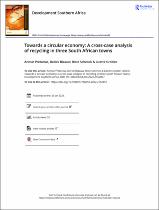| dc.contributor.author | Pretorius, Anmar | |
| dc.contributor.author | Blaauw, Derick | |
| dc.contributor.author | Schenck, Rinie | |
| dc.date.accessioned | 2023-04-13T12:24:19Z | |
| dc.date.available | 2023-04-13T12:24:19Z | |
| dc.date.issued | 2023 | |
| dc.identifier.citation | Pretorius, A. et al. (2023). Towards a circular economy: A cross-case analysis of recycling in three South African towns. Development Southern Africa. https://doi.org/10.1080/0376835X.2022.2162857 | en_US |
| dc.identifier.issn | 1470-3637 | |
| dc.identifier.uri | https://doi.org/10.1080/0376835X.2022.2162857 | |
| dc.identifier.uri | http://hdl.handle.net/10566/8787 | |
| dc.description.abstract | The concept of circular economy includes three aspects from a
human perspective, namely Reduce, Reuse, and Recycle. Studying
human behaviour is important in understanding and evaluating
the possible success of any of the three elements. We explored
the link between household waste practices and local
governments’ ability to provide proper waste management, as
stipulated in the South African Constitution, as well as the factors
linked to different waste management practices through a crosscase
analysis using a mixed-method research design. Households
in Calvinia, Philippolis and Polokwane handle waste differently
due to different levels of municipal waste services rendered and
the availability of local recycling options. | en_US |
| dc.language.iso | en | en_US |
| dc.publisher | Taylor and Francis Group | en_US |
| dc.subject | Recycling | en_US |
| dc.subject | Waste economy | en_US |
| dc.subject | Circular economy | en_US |
| dc.subject | South Africa | en_US |
| dc.subject | Waste management | en_US |
| dc.subject | Littering | en_US |
| dc.title | Towards a circular economy: A cross-case analysis of recycling in three South African towns | en_US |
| dc.type | Article | en_US |

